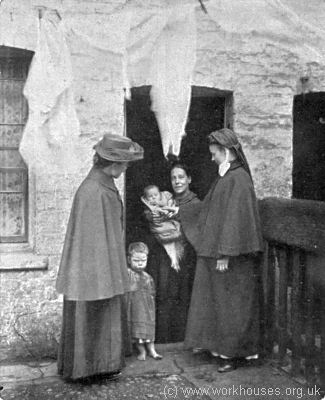
(By Andres Villatoro) – Care about them as much as you care about yourselves and think the same way that Christ Jesus thought: Christ was truly God. But he did not try to remain equal with God. Instead he gave up everything and became a slave, when he became like one of us. Philippians 2.4-7
Some of my favorite people to read about in Salvation Army history are the Slum Sisters. These women were regular soldiers who had such a heart and compassion for the lost and for the poor that they purposefully moved into some of the worst neighborhoods and slums of cities like London and New York. With “a Bible in their pocket, and prayer on their tongue,” their job was to be useful in anyway possible in their neighborhood putting on old clothes (instead of their uniform) and going to about 30 homes everyday as well as going into bars, brothels, even drug houses. They would help with cleaning, cooking, and taking care of the sick and of children. They would go into horrible and dark slum dwellings to bring a little of the light of God in and often had the opportunity to pray with the people they were helping and lead them to salvation. These women were daily living out the word and the love of God. They were not considered Christian radicals who wanted to live alternative lives, but just Christians who were doing their duty. To them, the love and work of God came first, their personal interests second.
As Salvationists, we feel either an obligation or a desire to work with the poor and with anyone else who needs help because it is present in our corps or in our community all the time. I often have felt the need to personally go out to the poor to show my version of the love of God to them. A lot of the times though, I feel that what I do is not enough, or that I am somehow very disconnected and very uncomfortable with someone who has no home or no food. I end up discouraged feeling that I can never really make a difference, and I even get to the point of not wanting to go out and help anyone anymore. You may have felt like that at one point or another, as though you were not meeting your obligation as a Christian. I happened across an article about the Salvation Army that caught my attention.
“The Salvation Army’s ministry was never one of condescending charity, in which the rich and cultured went “slumming” with baskets of food and lessons on home management and hygiene. They ministered to the destitute out of solidarity, not superiority…with a handful of exceptions, the Army’s early leaders had been poor. They knew poverty, its terror and futility, and they knew how little the light of the Christian gospel had penetrated the vast, dismal acres of city slums in which they had passed their lives. They now felt called to return there with the Good News that God and The Salvation Army loved all people alike.”
I realized that I was going to the lost and to the poor with my pride. I realized that I was the “rich” and the “cultured” who was going out to the poor wanting to give them something I had that they didn’t. I wanted to give them charity, not love. Is this really the way we should be looking at Christian service though? The Salvation Army did not begin like this. As brothers and sisters they helped each other out. It was their neighbors, their friends and their families that were the poor and needy. Today, it is hard to imagine that our own family would be ones who are in need. However, as Christians, it is in this way that we must minister to other people. As if they were our own brothers and sisters, not feeling like we are better than them or anyone else because the truth is we are not. We must look at them with the compassion and love of Christ, who ate with tax collectors and sinners. Christ was one of the people and though he was God, he did not “try to remain equal with God.” Philippians 2.6.
We can learn from people like the slum sisters who, out of compassion for people, dressed in rags and became the people they wanted to minister to. This is what effective ministry looks like. We need to keep the mindset that we are no different than the people that we are helping. We are all made in the image of God. You help not out of charity but out of brotherly and sisterly love. So go to your communities and your neighborhoods and “care about them as much as you care about yourselves” (Philippians 2.4). Come to them not with the mindset of superiority, but with solidarity, having a connection and helping them out of agreement and love. If Christ became like one of us then let us become like one of them.